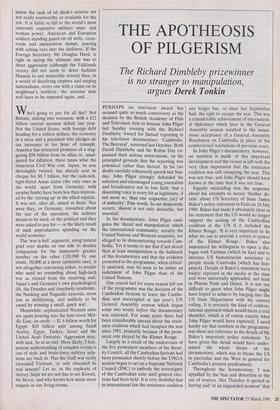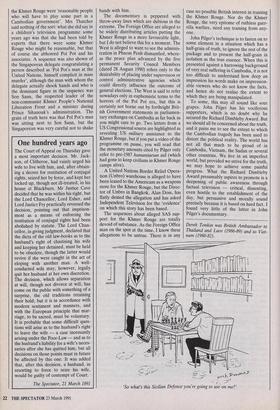THE APOTHEOSIS OF PILGERISM
The Richard Dimbleby prizewinner is no stranger to manipulation,
argues Derek Tonkin PERHAPS no television award has aroused quite so much controversy as the decision by the British Academy of Film and Television Arts to honour John Pilger last Sunday evening with the Richard Dimbleby Award for factual reporting in his television documentary 'Cambodia: The Betrayal', screened last October. Both David Dimbleby and Sir Robin Day ex- pressed their serious reservations, on the principled grounds that the reporting was polemical rather than factual. In his (no doubt carefully rehearsed) speech last Sun- day, John Pilger strongly defended his selection and encouraged young journalists and broadcasters not to lose faith 'that a dissenting voice is every bit as legitimate, if not more so, than one respective [sic] of of authority'. Fine words. In our democratic society, dissent is not only desirable, but essential.
In his documentary, John Pilger casti- gates the 'deceit and manipulation' which the international community, notably the United Nations and Western countries, are alleged to be demonstrating towards Cam- bodia. Yet it seems to me that if not deceit then at least manipulation is the hallmark of this documentary and that the evidence presented in the programme, when critical- ly analysed, may be seen to be rather an indictment of John Pilger than of the United Nations.
One crucial fact for some reason left out of the programme was the decision of the Cambodian factions to leave the Cambo- dian seat unoccupied at last year's UN General Assembly session which began some two weeks before the documentary was screened. For some years there had been considerable unease about the resist- ance coalition which had occupied the seat since 1981, primarily because of the prom- inent role played by the Khmer Rouge.
Largely as a result of the endeavours of the five permanent members of the Secur- ity Council, all the Cambodian factions had been persuaded shortly before the UNGA session began to set up a Supreme National Council (SNC) to embody the sovereignty of the Cambodian state until general elec- tions had been held. It is very doubtful that in international law the resistance coalition any longer has, or since last September had, the right to occupy the seat. This was a considerable achievement of internation- al diplomacy which later in the General Assembly session resulted in the unani- mous acceptance of a General Assembly Resolution on Cambodia in place of the controversial resolutions of previous years.
In John Pilger's documentary, however, no mention is made of this important development and the viewer is left with the very clear impression that the resistance coalition was still occupying the seat. This was not true, and John Pilger should have known at the time that it was not true.
Equally misleading was the sequence about his attempts to secure 'further de- tails' about US Secretary of State James Baker's policy statement in Paris on 18 July 1990. Baker had made it absolutely clear in his statement that the US would no longer support the seating of the Cambodian coalition at the UN if it included the Khmer Rouge. 'It is very important to do what we can to prevent a return to power of the Khmer Rouge.' Baker also announced his willingness to open a dia- logue with Vietnam (which he has) and to increase US humanitarian assistance to people inside Cambodia (which has hap- pened). Details of Baker's statement were widely reported in the media at the time and were universally applauded, not least in Phnom Penh and Hanoi. It is not too difficult to guess what John Pilger might have hoped to achieve by barging into the US State Department with his camera rolling. It is precisely the kind of confron- tational approach which would merit a cold shoulder, which is of course exactly what John Pilger would have expected. I need hardly say that nowhere in the programme was there any reference to the details of Mr Baker's important policy statement. To have given this detail would have under- mined the whole thrust of the documentary, which was to blame the US in particular and the West in general for Cambodia's present predicament.
Throughout the documentary, I was appalled by the bias and distortion in the use of sources. Mrs Thatcher is quoted as having said 'at an unguarded moment' that the Khmer Rouge were 'reasonable people who will have to play some part in a Cambodian government'. Mrs Thatcher said nothing of the sort: what she did say in a children's television programme some years ago was that she had been told by experts that there were some Khmer Rouge who might be reasonable, but that of course she abhorred Pol Pot and his associates. A sequence was also shown of the Singaporean delegate congratulating a person described as 'Poi Pot's man at the United Nations, himself complicit in mass murder', although the man with whom the delegate actually shook hands and who is the dominant figure in the sequence was Son Sann, the respected leader of the non-communist Khmer People's National Liberation Front and a minister during Prince Sihanouk's administration. The grain of truth here was that Pol Pot's man was sitting next to Son Sann, but the Singaporean was very careful not to shake hands with him.
The documentary is peppered with throw-away lines which are dubious in the extreme. The Foreign Office are alleged to be widely distributing articles putting the Khmer Rouge in a more favourable light, but I do not believe this for a moment. The West is alleged to want to see the adminis- tration in Phnom Penh dismantled, where- as the peace plan advanced by the five permanent Security Council Members (dated 28 August 1990) refers only to the desirability of placing under supervision or control administrative agencies which could directly influence the outcome of general elections. The West is said to refer nowadays only in euphemistic terms to the horrors of the Poi Pot era, but this is certainly not borne out by forthright Brit- ish Government statements in parliamen- tary exchanges on Cambodia as far back as you might care to go. Two letters from a US Congressional source are. highlighted as revealing US military assistance to the Khmer Rouge, but if you put a video of the programme on pause, you will read that the monetary amounts cited by Pilger only refer to pre-1987 humanitarian aid (which had gone to keep civilians in Khmer Rouge camps alive).
A United Nations Border Relief Opera- tion (Unbro) warehouse is alleged to have been leased to the Americans as a weapons store for the Khmer Rouge, but the Direc- tor of Unbro in Bangkok, Alan Doss, has flatly denied the allegation and has asked Independent Television for the 'evidence' on which this story has been based.
The sequences about alleged SAS sup- port for the Khmer Rouge are totally devoid of substance. As the Foreign Office man on the spot at the time, I know these allegations to be untrue. There is in any case no possible British interest in training the Khmer Rouge. Nor do the Khmer Rouge, the very epitome of ruthless guer- rilla warfare, need any training from any- one.
John Pilger's technique is to fasten on to some element in a situation which has a half-grain of truth, to ignore the rest of the package and to present the half-grain in isolation as the true essence. When this is presented against a harrowing background of very real suffering in Cambodia, it is not too difficult to understand how deep an impression his words make on impression- able viewers who do not know the facts, and hence do not realise the extent to which they are being manipulated. To some, this may all sound like sour grapes. John Pilger has his vociferous supporters, which is no doubt why he secured the Richard Dimbleby Award. But we should all be concerned about the truth, and it pains me to see the extent to which the Cambodian tragedy has been used to distort the political reality. The world has not all that much to be proud of in Cambodia, Vietnam, the Sudan or several other countries. We live in an imperfect world, but provided we strive for the truth, we may hope to achieve some painful progress. What the Richard Dimbleby Award presumably aspires to promote is a deepening of public awareness through factual television — critical, dissenting, even hostile to the establishment of the day, but persuasive and morally sound precisely because it is based on hard fact. I found very little of the latter in John Pager's documentary.
Derek Tonkin was British Ambassador to Thailand and Laos (1986-89) and to Viet- nam (1980-82).
'So what's this Sicilian Defence you're going to use on me?'



























































 Previous page
Previous page